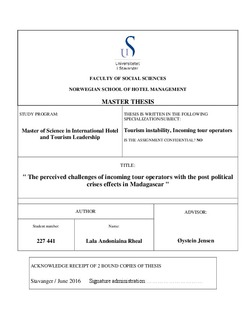| dc.description.abstract | The purpose of this thesis is to contribute to the understanding of the effects of political instability on the tourism industry in Madagascar. It particularly investigates the effects of the political incidents of 2002 and 2009 on incoming tour operators and their marketing environment. Based on the roles of incoming tour operators in the tourism distribution channels and their micro and macro environment, this study seeks to explore the impacts of the political crises on the marketing environment, their perception of risk and uncertainty within a volatile political climate and the responses of incoming tour operators to these challenges.
A qualitative approach based on personal interviews was conducted to collect the required data. The findings indicated that a decline of demand, internal changes followed by a period of inactivity, damaged destination image, late recovery for tourism industry and economic downturn were the main consequences of the two political crises. To manage these impacts, incoming tour operators implemented diversification of their portfolios of supply services, product innovation, market diversification and cooperation with private and public institutions. Incoming tour operators also perceived business related risks such as loss of partnerships, product constraints, competition and uncertain financial situation in addition to the exogenous low level of safety and security risk. Furthermore, the findings revealed that they attempted to minimize or eliminate these risks by the means of development of trust-based relationships, improvement of human resources management practices, product innovation and implementation of safety and security measures. Thus, the perceived challenges stemmed from the uncertainty of the environment in which incoming tour operators are operating that challenges these companies to maintain their market relationships, the rebuilding of the image of the destination and the elaboration of a disaster management plan.
Key words: incoming tour operators, risk and uncertainty, disaster management, risk management
| nb_NO |
